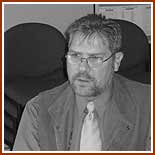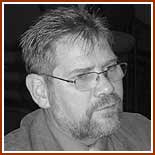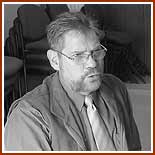 |
|
 "You know what to do when you're looking at a body, or dealing with a 40-foot wall of fire. You have to concentrate on your task, so you have to shut your emotions down."  "If you've been traumatised and then you go home, who are you responsible for now? You're responsible for going back to your family, and how are you going to live that out?"  "There are stories about people who have not reconnected, and who have got onto the back of a truck again and then are doubly traumatised."  "You need to disconnect to do the job, but that disconnection has a cost. We can send people back home, and sometimes they're there, but they may not actually be present."  "People remind themselves that often it can only take two or three breaths before people are unconscious in thick smoke. They don't actually feel something from then on." |
John Rigby Coordinating chaplain for the Country Fire Authority

I've been with the CFA for the last three years. We work hard at making sure anybody who has been involved in a critical incident tells their story straight away. I was given the job as CFA chaplain just after the Linton fires, when the Linton Inquest had begun. That's where the firefighters were killed up at the back of Linton, near Ballarat. So my first role when I started with the CFA was attending the inquests. Let me give you an understanding of how the CFA support structure actually works. There are approximately 40,000 people who are active members in the CFA. Supporting these 40,000 are about 160 peers who are firefighters themselves. They are CFA members who are specifically trained to be frontline responders to people who are involved in traumatic events. Take yesterday, for example. There was a motor vehicle accident, a rather serious one. The CFA people responded, and when they got back to the station, a peer team at the station was waiting for them. The initial process is help them get coffees, and create an environment where they are beginning to feel free to talk about what they have seen and experienced. Then we do a defuse. A defuse is a simple process of helping people tell their story - what they've seen, what they've experienced. The process first begins with what they were doing before they went. One of the first questions you'll ask a fire fighter is, 'What were you doing before the call came? Where were you? What was your experience?' It helps us to identify their stress level before they went to the stressful experience. For example, if they're in a situation where they've been fighting with their spouse, their stress levels are going to be up to start with. They've gone off to a very stressful scene, and they're actually doubly stressed when they come back to the station. It helps us to flag that, maybe this person here may need a little extra work after we finish. The process of helping people tell their story is a simple one. It can take anything up to an hour, depending on how many people are involved. It's just getting them to say, 'This is where I was, this is what I was doing, and this is what I saw'. We have found that general process is very healing. It helps people to get the facts of the story. The reason we do this is we have found that if we don't, people can generate their own ideas of the scene that may not actually be completely true. Then you send them home, and they've got their constructed story, and unless it's put into the context of what other people were experiencing, it may not be correct. Therefore the emotions they have generated in relation to the experience may not be quite anchored. This may affect their ability to process the experience and get it out of their system. What we try to do is to help people by hearing what the total story is. And we do this through the individual retelling of everybody's stories. From this we can then construct the correct story that every can take home with them. Now what may happen, if it's been a very serious incident, like a line of duty death - a death of a child is often an incident that is most traumatic for many firefighters - is that we will do a debrief. That is bringing them back in, about 72 hours later, to do the same thing again. But this time we talk about things at the thoughts and feelings level, as in, 'How do you feel about this?' The thoughts and feelings, what they think about this and that, is helping them to work through the emotional residue that the event has actually caused. It just helps them to unfold their story. For instance, if we're going around the room, we will go around with a defuse first of all. And then we will say, well, what are you thinking about that now? What have been your thoughts in the last couple of days since that scene? And then we will get to, 'How are you actually feeling about this?' You may find the feelings will come out at two levels. There are the feelings about the people who were involved, but then the deeper level is the feelings about how I've responded and where this is leading me. To me, that is probably the most healing part of the process, when you are able to get them to talk about how this has impacted them. The CFA wants to get people back into action. We want to get people back active as best as we can. But we know that in a traumatic event - and we almost train people to do this - there is a disconnection between being there, and actually being present. Often you need to disconnect to do the job, but that disconnection has a cost. We can send people back home, and sometimes they're there at home, but they may not actually be present. And so the goal of the debriefing and defusing experience is to reconnect for the firefighter both the being there and the being present. There are stories about people who have not reconnected, and who have got onto the back of a truck again and then are doubly traumatised. So we work hard at trying to reconnect people back with themselves. We've found one of the ways to do this is to help them accept what they are actually responsible for. If you've been traumatised and then you go home, who are you responsible for now? You're no longer responsible for the people out on the fire ground. You're responsible for going back to your family, and how are you going to live that out?  We also then help them to identify the difference between the reality of their experience, their fantasy and what actually is the case. By that I mean what they realistically could have achieved in the set of circumstances they were dealing with. We also then help them to identify the difference between the reality of their experience, their fantasy and what actually is the case. By that I mean what they realistically could have achieved in the set of circumstances they were dealing with.It's the fantasy that keeps the 'what ifs' and the 'if onlys' flying round. If only I hadn't gone back out to fight the fire, or try to save something. The reality of it is that they did, but if you leave them stuck in the fantasy, they never reconnect with themselves. For me that is the key. Confronting fantasy needs to be done carefully, because sometimes they've built such a structure around their fantasy, and the guilt and self blame it generates, that you can't just say to them, "Oh well, that's ridiculous". So firstly, the debrief process is helping them become aware of the situation, what really happened and the facts. And secondly, it's helping them become aware of what's happening inside them emotionally, where it's actually affected them. I'm also a chaplain for the building industry. On a building site where there has been a traumatic event - where someone has died, or a near miss has been very serious and the person has been hospitalised - unless you help the guys on that site out, there will be another accident on that site fairly quickly. It's because people are emotionally disconnected. They're off thinking, 'Could have been me. What if we'd done this?' And so they are still working, while their mind is processing their thoughts and experiences and feelings. They are doing the job, but without concentrating on what they are actually doing. I think it's one of the consequences of being trained to know what to do when you're looking at a body, or dealing with a 40-foot wall of fire. You have to concentrate on your task, so you have to shut your emotions down to complete the task. That generates the disconnection I'm talking about. A classic example occurred several years ago. One of the firefighters from the Caroline Springs brigade was killed fighting a fire, out the back here at Laverton. He was out doing his job, and through a series of unfortunate circumstances, he was killed. And today, even though we've provided the very best services we can, there are some members of the brigade still carrying the cost of that, simply because of the close relationship that they had with that firefighter. There have been serious levels of depression, there have been outbursts of anger, all those sorts of things. We're continuing to work with this brigade, and now I'm feeling fairly confident that by and large we've done a good job helping the affected firefighters get back on their truck, and effectively be able to continue their service for the CFA. They often need to process the story to help reconnect. Sometimes a firefighter who has been in a critical incident goes home to his wife, and the wife may ask just a simple question, and an angry outburst comes, because something of him is still at the fire. She's asking him something that for her is quite normal and natural, but it cuts across where he is at emotionally. The desire is to help them before they come home to at least come back to some level of normality. For me, the defuse process is holy ground, it really is holy ground. When people tell their story, of what they saw and what they felt and what they experienced, and you begin to listen to them, what happens is a connection between everybody. It's a powerful team experience. Because they were a team out there, in telling the story of how each one had a role to play, a sense of reality comes to the surface. What is really interesting is you'll see people come in who are traumatised, grey, shoulders slumped, and after an hour of helping them tell their collective story, the sense of air in the room changes from being dark, to becoming light. We follow up then with a cup of tea or coffee. We sit around and talk, and that may take another hour before we send them home.  I think there was an ethos in the 1930s to just get on with life. There would have been very few people for the firefighters to tell their story to. And that is one of the differences I hope exists today. I think there was an ethos in the 1930s to just get on with life. There would have been very few people for the firefighters to tell their story to. And that is one of the differences I hope exists today.The ongoing result for individuals who never have a chance to let go of the trauma they have suffered and the resulting disconnection, are feelings of anger, alcoholism, a need to control, depression, relationships breakdown, conflict in the work situations, and an inability to concentrate. One of the big things is the sense of feeling responsible for something. You'll often find where there has been a critical incident on a building site that everybody will want to take up a collection for the partner of the person who has been killed. It's as if we want to take responsibility for something. But it keeps the disconnection going. Rather than face the reality now, we get ourselves getting busy doing something. I don't see this so much in the CFA, but I know that it is one of the core issues of post traumatic stress syndrome. That sense of wanting to take responsibility for something, trying to gain control in this place where I'm out of control. One of the things that I hear often in the CFA is people reminding themselves that often it can only take two or three breaths before people are unconscious in thick smoke. They don't actually feel something from then on. You can't be critical of the way they've dealt with the traumatic incidents of the 1939 fires. There is a sense of sadness that there weren't the support mechanisms in place for those people. What repercussions have there been for us socially, as a culture, I wonder? Read more about the post traumatic stress on survivors of Black Friday in the Oral History section |
The FireFighters
Len Foster
Chairman and CEO of the Australasian Fire Authorities Council Gary Morgan Chief Fire Officer for the Department of Sustainability and the Environment Russell Rees CFA Chief Officer Allan Marks CFA Group Officer for the Dandenong Ranges Fire Brigade Group Greg Head CFA Captain of the fire brigade in Warburton John Rigby Coordinating chaplain for the Country Fire Authority Mike Leonard Manager of Strategic Planning - Fire Management, at the Department of Sustainability and Environment John Masterton Burns surgeon. Head of the Burns Unit at the Alfred Hospital from 1967 - 1996. |
 |